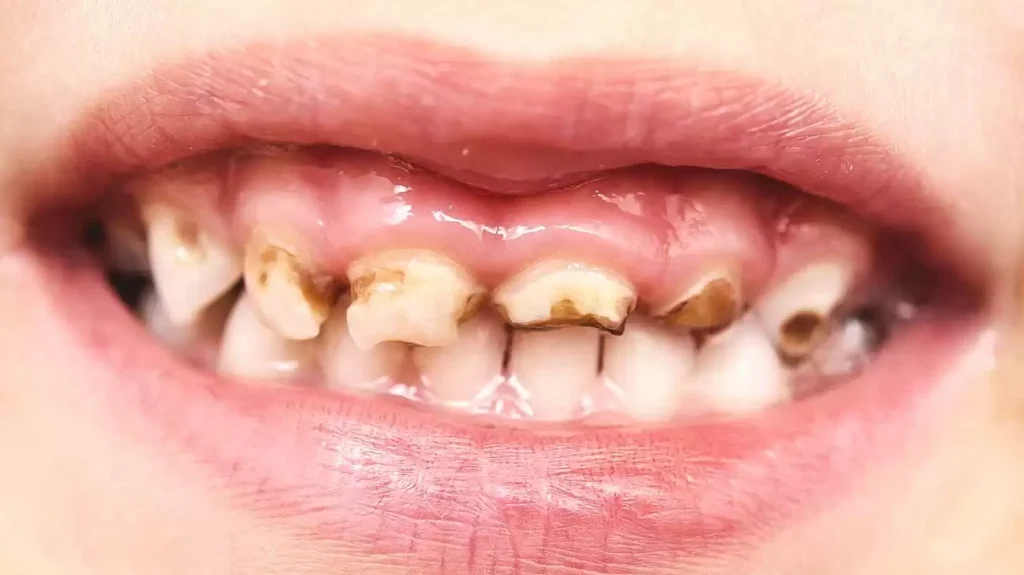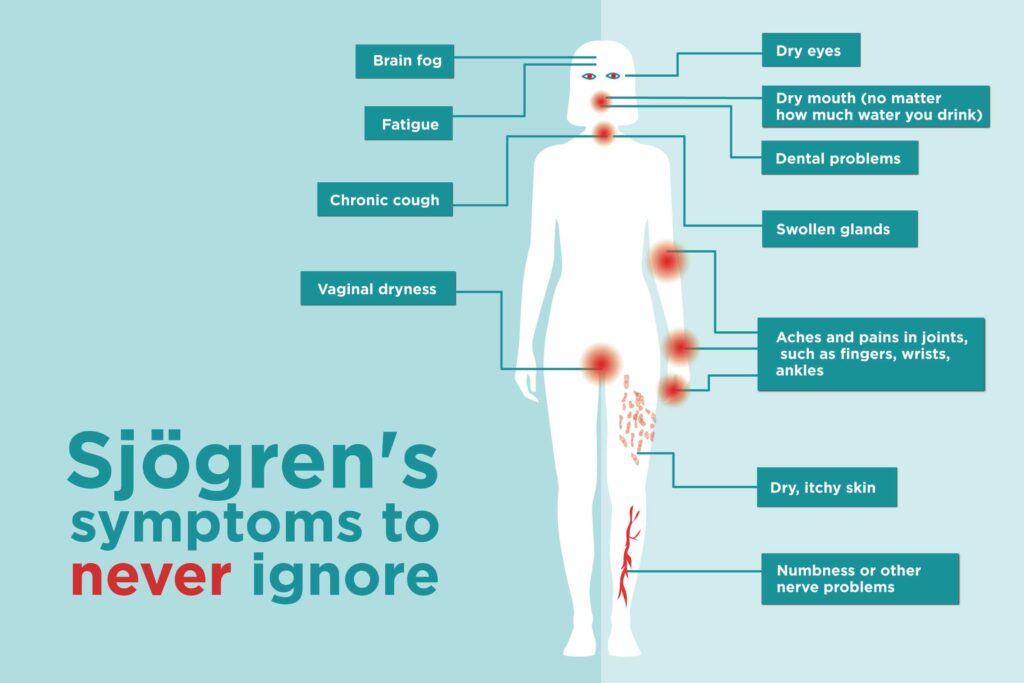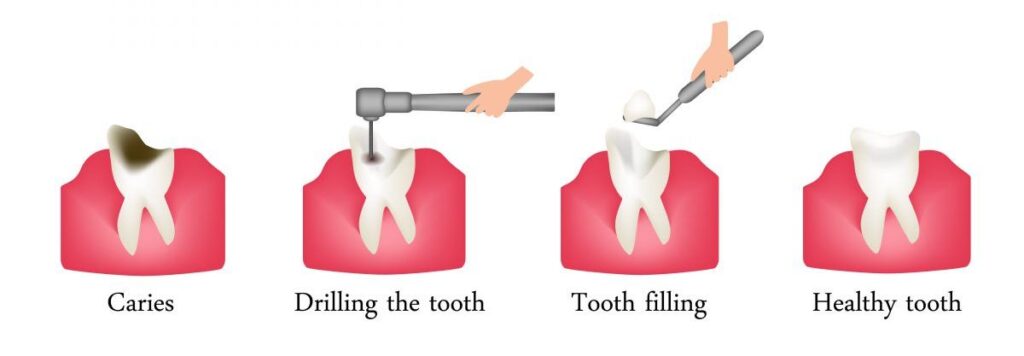What is the definition of dental caries?
Dental caries, often known as cavities, are erosions of the tooth’s surface produced by a combination of bacteria, acids, plaque, and tartar. it affect both children and adults, and they are most commonly caused by poor oral hygiene. caries are normally harmless at first, but if they progress to the nerve or base of a tooth, they can become painful. caries can lead to a tooth abscess, which is a more painful and possibly dangerous condition if left untreated.

Dental caries are widespread, however they may frequently be avoided by adopting proper oral hygiene, such as brushing and flossing on a regular basis. Unless it becomes severe, does not react to over-the-counter pain medicines, or progresses to a tooth abscess, it normally do not require immediate medical attention. The decaying material is removed using a drill, and the resultant hole is filled with a stable dental material.
If you believe you have caries, have a toothache that lasts longer than a few days, or if your tooth pain is not relieved by over-the-counter pain medicines, see a doctor right once.
What are the signs and symptoms of tooth decay?
In most cases, dental caries does not cause any major symptoms. Toothache or sensitivity to hot or cold meals and beverages may be present when symptoms are present.
Caries in the teeth can cause a variety of symptoms.
You may have dental caries symptoms all of the time or only on occasion. Any of these symptoms might be severe at times.
Dental caries symptoms are mainly limited to the mouth. They are as follows:
- A tooth’s surface has holes in it.
- When chewing there is pain.
- Food and beverage sensitivity to heat or cold
- Symptoms of toothache
Dental caries can be a dangerous condition in some situations, and it should be evaluated right once in an emergency room. If you or someone you’re with has any of these significant symptoms, seek medical help right away you can get instant dental consultation by booking an appointment now.
- Jawbone swells or hurts severely.
- Toothache that is uncontrollable with over-the-counter pain medications
What causes dental caries in the first place?
Bacteria and harmful chemicals such as acid that come into touch with your teeth create dental caries. Normal bacteria in your mouth interact with food remains and acids to form a sticky film known as plaque after you eat. If you do not floss and wash your teeth on a regular basis, plaque will build up and harden into tartar. Plaque and tartar, as well as bacteria and acids, can erode the enamel of your teeth, resulting in caries, or cavities, which are holes in the enamel. It normally start off as tiny, shallow holes; if left untreated, they can get larger and deeper, resulting in tooth loss or destruction.
What factors put you at risk for dental caries?
A variety of variables contribute to the development of dental caries. caries does not affect everyone who has risk factors. it is caused by a number of causes, including:
- Getting older (older teeth form plaque more quickly)
- Autoimmune illnesses (such as Sjögren’s syndrome, which is defined by dry eyes, dry mouth, and connective tissue dysfunction) are characterised by dry eyes, dry mouth, and connective tissue disorder.
- Mouth is parched (inadequate salivation)
- Consumption of sugary, starchy, or acidic foods or beverages in excess
- Inadequate dental hygiene
- Gums that are receded
- Smoking

lowering your chances of developing dental caries
You might be able to reduce your risk of dental caries by doing the following:
- Excess sugar, starch, or acid in your diet should be avoided.
- Sticky meals and foods that can get trapped in your teeth should be avoided (such as peanut butter or popcorn)
- Brushing your teeth twice a day is recommended.
- At least twice a day, floss your teeth
- Fluoridation of the public water supply
- Visiting your dentist on a regular basis for cleanings and exams
- If your dentist recommends it, you should have dental sealants, or protective coatings, placed to your teeth.
- Following your dentist’s recommendations for fluoride treatments
- You’re looking for a cure for your dry mouth issues.
- Artificial sweeteners are used instead of sugar.
- Mouthwash with antiseptic
What is the treatment for dental caries?
Dental caries should be treated as soon as possible by your dentist to avoid further tooth damage or infection. it can be detected with a basic dental checkup, and an X-ray can assist your dentist estimate the amount of the caries.

Dental caries is usually harmless, but a bigger or deeper region of tooth deterioration might be unpleasant. If you have a toothache, pain medications like as ibuprofen (Advil, Motrin) or acetaminophen (Tylenol) may help you feel better until your dentist can treat the caries.
Dental treatment, in addition to drugs, is required to fill the cavity. A local anaesthetic will be used to numb your mouth by your dentist. After numbing your tooth, your dentist will use a drill to remove the decay and shape the surrounding tooth so that new materials may be filled in neatly. Caries that is more advanced may need more significant dental work, such as a root canal or tooth extraction. if you think you have dental caries and need a treatment , you can go to one of the best dental clinic in delhi
What are the risks associated with dental caries?
Caries of the teeth usually do not pose a life-threatening concern. Following the treatment plan you and your health care expert devised particularly for you can help reduce your chance of significant problems. Dental caries can lead to a variety of complications, including:
- Abscess in the mouth
- Pain during chewing Difficulty chewing
- Abscess of the tooth
- Damage to or loss of teeth
- Sensitive teeth

